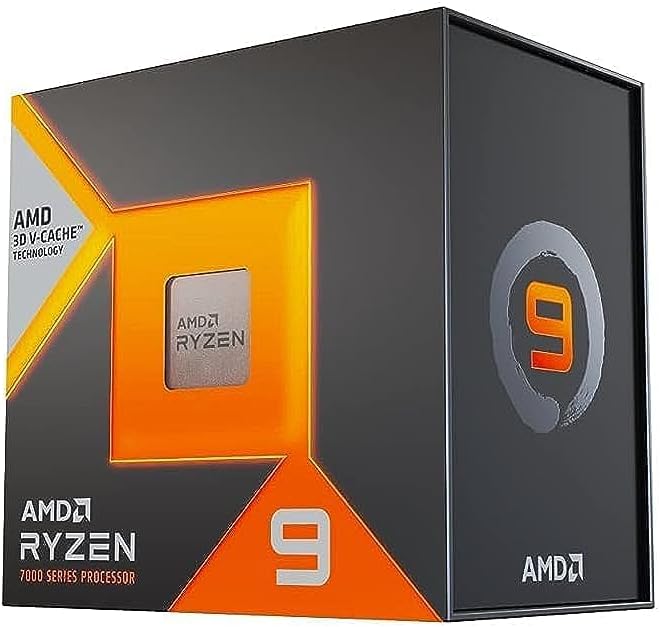About this deal
The Ryzen 9 7950X3D pretty much matches the 7950X in Blender and Adobe Photoshop and Adobe Premiere tests, though it lags a bit in VRay 5 (though not by that much). Where it really shines though is with HandBrake 1.6. This is one of the creative tests we use where we get to measure it's true real-world performance on a creative workload, especially one that is highly CPU dependent. We've already tested the Ryzen 9 7950X3D and named it the fastest gaming CPU, while the 7900X3D hasn't yet entered the DF labs but is another strong option at a lower price point. Cache is simply a very direct form of working memory that the processor keeps close by for instructions and data that it is using at that very moment. The more cache a processor has, the fewer trips to RAM it needs to make for data or instructions, which greatly improves performance for many common tasks. Generally, more cache is better, and the 7950X3D has more cache than any consumer processor available today. I already have DDR4. AMD expects me to just throw this into the trash and buy expensive new DDR5 for a 1% difference in performance. It even bothers me from an e-waste perspective, let alone the financial cost. Stress testing tools like Cinebench R23 push the processor to its engineered limits in terms of power use and operating temperature, and I use these to make sure that every chip is pushed to full 100% CPU utilization under load to determine the minimum and maximum amount of power the processor uses (measured in watts) and the minimum and maximum temperature recorded (measured in Celsius).
The heat produced by the 3D V-Cache forced AMD to lower the max operating temperature of the processor from 95 degrees C on the Ryzen 9 7950X to 89 degrees C on the Ryzen 9 7950X3D. A corresponding reduction in thermal design power (TDP) rating also occurred, with the Ryzen 9 7950X having a 170-watt (W) TDP and the Ryzen 9 7950X3D having a 120W TDP. By this measure, the Ryzen 9 7950X3D outperforms the 7950X by about 10% and the 13900K by about 6% when I average out all of the degrees of difference between the three chips, across every test. But even then, the demonstrably better performance of the 7950X3D can be somewhat obscured, since Intel especially benefits from much higher synthetic benchmark scores that don't really translate cleanly into actual real-world performance where the 7950X3D is simply the better processor overall. And this test highlights that even at 1440p the extra L3 cache of the 7950X3D tangibly makes a difference to the gaming performance of the system at the highest graphical presets. But, as always, at 4K it's all about the GPU. Metro is the only benchmark that displays some difference between the three chips attached to the RTX 4090, and then that's more down to some vagaries in optimisation and drivers. My PC runs every game that I play without issues. And with the recent GPU upgrade I'll be happy for another year or so and will upgrade when needed.
Recently Viewed
There are some tradeoffs to attaining the leading gaming performance, though — some games don’t benefit from the 3D V-Cache, and the chip isn’t as fast in productivity apps as competing Intel chips. The 7950X3D also suffers from many of the pain points we’ve already seen with the fledgling AM5 platform — the motherboard ecosystem is more expensive than Intel’s offerings, and the strict requirement for DDR5 significantly increases costs compared to Intel’s DDR4-friendly platform. While a higher TDP usually relates to higher performance, the inclusion of the added 3D V-cache means that the processor can access a larger pool of superfast cache memory, which is even more useful when gaming than just throwing raw power at the problem. With its own dedicated extra cache, there are fewer fetch operations to the PC's main memory, so the chip runs more efficiently, and potentially cooler under load.
Gaming performance measures how well the processor calculates gaming operations like in-game physics by running several games' integrated benchmark tools like Returnal, Total War: Warhammer III, and F1 2022. In all cases, I run the benchmarks on the lowest graphics settings available at 1080p and using the most powerful graphics card I have available (in this case, an Nvidia RTX 4090) and with 32GB DDR5 RAM to isolate the actual CPU operations I am testing without having to worry about inteference from excessive memory or graphics management. The fact performance of X3D CPU is all over the place bothers me too. Yes it's fast in -some- games, but then you get less overall performance in several important applications. If I just used my PC for gaming, I would have bought a console, I don't like the idea of having to make a trade-off with X3D CPU. The amount of cache on CPUs has grown over time usually by very small steps, but there have also been a few times when AMD and Intel have significantly jumped up the amount of cache in an effort to boost performance. These efforts in the past have seen mixed results with, at the best of times, a modest performance gain occurring and, at the worst of times, nothing really changing. In part, the mixed results are due to software development, as apps need to be explicitly programmed to take advantage of the added cache for a noticeable improvement to occur.Jan 5th 2023 AMD Ryzen 7000X3D Announced, Claims Total Dominance over Intel "Raptor Lake," Upcoming i9-13900KS Deterred (177)
 Great Deal
Great Deal 